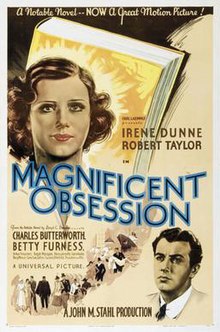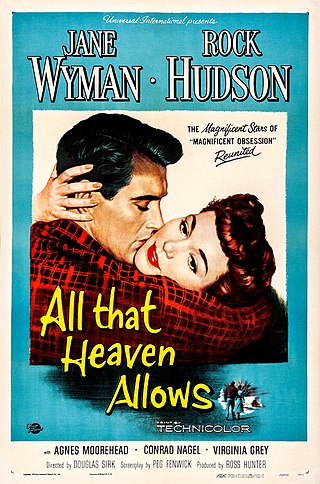
All That Heaven Allows is a 1955 American drama romance film directed by Douglas Sirk, produced by Ross Hunter, and adapted by Peg Fenwick from a novel by Edna L. Lee and Harry Lee. It stars Jane Wyman and Rock Hudson in a tale about the social complications that arise following the development of a romance between a well-to-do widow and a younger man, who owns a tree nursery. In 1995, the film was selected for preservation in the United States National Film Registry.

Douglas Sirk was a German film director best known for his work in Hollywood melodramas of the 1950s. However, he also directed comedies, westerns, and war films. Sirk started his career in Germany as a stage and screen director, but he left for Hollywood in 1937 after his Jewish wife was persecuted by the Nazis.

Rock Hudson was an American actor. One of the most popular movie stars of his time, he had a screen career spanning more than three decades. He was a prominent figure in the Golden Age of Hollywood.

Theodora Goes Wild is a 1936 American screwball comedy film that tells the story of the residents in a small town who are incensed by a risqué novel, unaware that the book was written under a pseudonym by a member of the town's leading family. It stars Irene Dunne and Melvyn Douglas and was directed by Richard Boleslawski. The film was written by Mary McCarthy and Sidney Buchman. Dunne was nominated for an Academy Award as Best Actress in a Leading Role and the movie was also nominated for the Best Film Editing.

Magnificent Obsession is a 1929 novel by American author Lloyd C. Douglas. It was one of four of his books that were eventually made into blockbuster motion pictures, the other three being The Robe, White Banners and The Big Fisherman.
Lloyd Cassel Douglas was an American minister and author.

John Malcolm Stahl was an American film director and producer. He is best known for his films such as Leave Her to Heaven (1945), Imitation of Life (1934), The Keys of the Kingdom (1945), and Back Street (1932).
Show Boat is a 1936 American romantic musical film directed by James Whale, based on the 1927 musical of the same name by Jerome Kern and Oscar Hammerstein II, which in turn was adapted from the 1926 novel of the same name by Edna Ferber.

Ross Hunter was an American film and television producer and actor. He is best known for producing light comedies such as Pillow Talk (1959), and the glamorous melodramas Magnificent Obsession (1954), Imitation of Life (1959), and Back Street (1961).

Rochelle Hudson was an American film actress from the 1930s through the 1960s. Hudson was a WAMPAS Baby Star in 1931.

The Count of Monte Cristo is a 1934 American adventure film directed by Rowland V. Lee and starring Robert Donat and Elissa Landi. Based on the 1844 novel The Count of Monte Cristo by Alexandre Dumas, the story concerns a man who is unjustly imprisoned for 20 years for innocently delivering a letter entrusted to him. When he finally escapes, he seeks revenge against the greedy men who conspired to put him in prison.
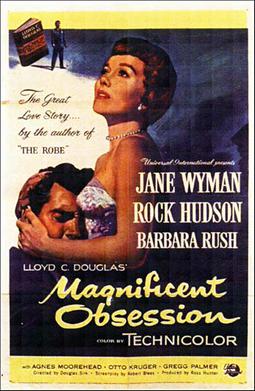
Magnificent Obsession is a 1954 American romantic drama film directed by Douglas Sirk starring Jane Wyman and Rock Hudson. It is a remake of the 1935 film by the same name, starring Irene Dunne and Robert Taylor. Both are based on the 1929 novel Magnificent Obsession by Lloyd C. Douglas.
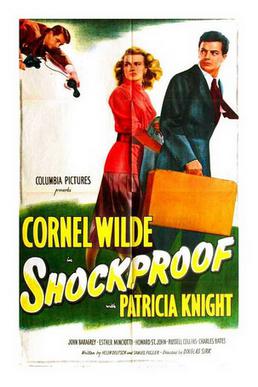
Shockproof is a 1949 American crime film noir directed by Douglas Sirk and starring Patricia Knight and Cornel Wilde. Wilde and Knight were husband and wife during filming. They divorced in 1951.

Sleep, My Love is a 1948 American noir film directed by Douglas Sirk. It features Claudette Colbert, Robert Cummings and Don Ameche.

Roberta is a 1935 American musical film released by RKO Radio Pictures and directed by William A. Seiter. It stars Irene Dunne, Fred Astaire, Ginger Rogers, and features Randolph Scott, Helen Westley, Victor Varconi and Claire Dodd. The film was an adaptation of the 1933 Broadway musical Roberta, which in turn was based on the novel Gowns by Roberta by Alice Duer Miller. It was a solid hit, showing a net profit of more than three-quarters of a million dollars.

The Ambassador is a 1984 American political thriller film directed by J. Lee Thompson and starring Robert Mitchum, Ellen Burstyn, Rock Hudson and Allan Younger. It was the last theatrical release starring Rock Hudson before his death in October 1985.
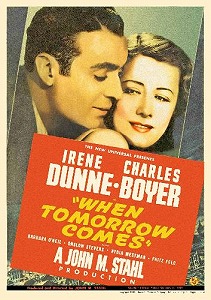
When Tomorrow Comes is a 1939 American romantic drama directed by John M. Stahl, and starring Irene Dunne and Charles Boyer. The screenplay concerns a waitress who falls in love with a man who later turns out to be a married concert pianist. Bernard B. Brown won the Academy Award for Best Sound.

Interlude is a 1957 American CinemaScope drama romance film directed by Douglas Sirk and starring June Allyson and Rossano Brazzi.

The Secret of Madame Blanche is a 1933 American pre-Code drama film directed by Charles Brabin and written by Frances Goodrich and Albert Hackett. The film stars Irene Dunne, Lionel Atwill, Phillips Holmes, Una Merkel and Douglas Walton. The film was released on February 3, 1933, by Metro-Goldwyn-Mayer.

Jane Keckley was an American actress of the silent and sound film eras.
